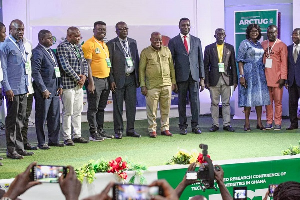Technical universities in Ghana have stressed the urgent need for collaboration between these institutions and industry, driven by government initiatives, to bridge the existing gap between academia and industry in the country.
“There is a need for the government to establish a policy framework, including fiscal and regulatory measures, to motivate industry to engage in collaborative activities with academia and foster national development," the universities stated.
This call was made in a communiqué at the end of the 3rd Biennial Applied and Research Conference of Technical Universities in Ghana (ARCTUG, 2024), held at Sunyani Technical University.
The conference, themed “The University, Industry, and Government Partnership for
Accelerating Innovation and Entrepreneurship for National Development” underscored the importance of synergy among these sectors.
President Nana Addo Dankwa Akufo-Addo, speaking at the conference, reiterated the government’s commitment to STEM (Science, Technology, Engineering, and Mathematics) education in Ghana and emphasized the need for strong collaboration between academia, industry, and government to tackle the country’s development challenges.
According to the technical universities, research institutions, particularly technical universities, face low funding for research activities, with the cost of scientific experiments exceeding the capacity of the institutions' internally generated funds.
They stressed that government, industry, and academia should explore common research and funding platforms to identify key developmental gaps and how to finance research to address these gaps.
Furthermore, the universities called for the government to adequately resource technical universities to fulfill their niche areas and mandates as outlined in the Technical Universities Act (Act 922, 2016 as amended).
They suggested that the government provide sufficient funding for research, such as the development of electric vehicles in Ghana.
The technical universities also noted the need for the government to consider waiving import duties and other taxes on scientific research equipment and tools to facilitate access for technical universities and other research institutions, thereby enhancing cutting-edge research for national development.
Moreover, the universities proposed the urgent establishment of a Technology Development Board in Ghana to motivate industries and research and development institutions towards product innovation, job creation, and support for entrepreneurs.
To strengthen the relationship between academia and industry, the technical universities recommended establishing an annual National Technology and Skills Week.
This event would serve as a platform to showcase technological outputs from technical universities and engage industry players in dialogue and action.
The universities emphasized the importance of leveraging the government’s intellectual property legal framework to generate innovation, commercialize intellectual property, and mobilize financial resources to support the operations of technical universities for national development.
Besides, they suggested that technical universities reassess their internal promotion criteria to reward innovation and intellectual property generation that have commercial value for growth.
In a political context, the technical universities urged political parties in Ghana to clearly articulate in their election manifestos the policy frameworks or directions with which they intend to resource technical universities to drive innovation through research for national development.
Regional News of Thursday, 8 August 2024
Source: Richmond Acheampong, Contributor
Technical universities urge government to foster industry collaboration for national development
Entertainment












